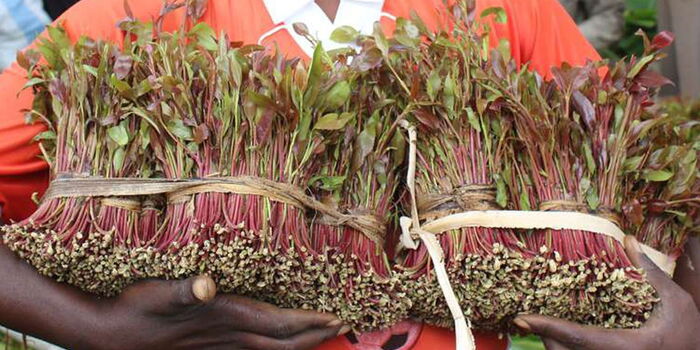Kenya Finalizes Miraa Export Agreement with Djibouti.
In a major win for Kenya’s Miraa (khat) farmers and exporters, the Ministry of Agriculture, through the Agriculture and Food Authority (AFA), has officially announced that Djibouti will now serve as a new export destination for the stimulant crop.
This exciting development was confirmed in a statement released on Wednesday, July 23, by AFA Director General Bruno Linyiru. He attributed the achievement to continuous efforts and bilateral discussions that have taken place between Kenya and Djibouti since last year.
According to Linyiru, this new export market is expected to significantly boost Kenya’s economy while also enhancing the diplomatic and cultural ties between the two countries.
“The Agriculture and Food Authority is pleased to inform the public and all Miraa stakeholders that Djibouti has officially opened its market to Kenyan Miraa. This follows a series of successful trade talks between the two governments,” Linyiru stated.
A photo collage showing Muguka (left) and Miraa (right)
(Image source: screen grab)
Linyiru noted that the breakthrough came as a result of a Kenyan trade delegation visiting Djibouti in October 2024, which was followed by a return visit from Djibouti officials in November the same year. These high-level meetings led to the formal agreement to allow Miraa imports into Djibouti—provided exporters meet the country’s strict product quality and regulatory standards.
He urged Kenyan traders interested in taking advantage of the new market to ensure full compliance with Djibouti’s import rules. This includes securing the necessary permits and making sure their Miraa meets all product safety and quality guidelines set by authorities in Djibouti.
“This is a significant step forward in expanding and diversifying Kenya’s Miraa export destinations,” said Linyiru. “We urge local traders to seize this new commercial opportunity and begin forming partnerships with Djiboutian buyers to unlock new business prospects.”
Miraa was formally declared a scheduled crop in November 2016, following amendments to the Crops Act of 2013. This legal recognition allowed the government to step in and regulate the crop’s production, quality control, and export processes.
The crop continues to be a critical source of income for many Kenyan communities, especially in the counties of Meru, Tharaka Nithi, and Embu. Owing to its growing demand and high profitability, Miraa farming has also spread to other regions such as Marsabit, Kirinyaga, Nyeri, Murang’a, Machakos, Makueni, Laikipia, and West Pokot.
Earlier this year, on February 15, Agriculture Cabinet Secretary Mutahi Kagwe announced that the government had increased the official prices of Miraa.
Under the revised pricing structure:
- Grade One Miraa rose from Ksh700 to Ksh1,300
- Grade Two Miraa increased from Ksh350 to Ksh700
- Alele Miraa doubled in price, going from Ksh500 to Ksh1,000
Later, during a visit to Meru on April 2, President William Ruto pledged full government support for Miraa farmers. He revealed that his administration had launched a countrywide crackdown on illegal Miraa cartels that have long exploited farmers by cutting them off from premium markets and profits.
This new export deal with Djibouti is expected to open fresh economic doors for Kenyan Miraa traders while reinforcing the government’s commitment to ensuring farmers get fair value for their produce.
Join Gen Z New WhatsApp Channel To Stay Updated On time https://whatsapp.com/channel/0029VaWT5gSGufImU8R0DO30


